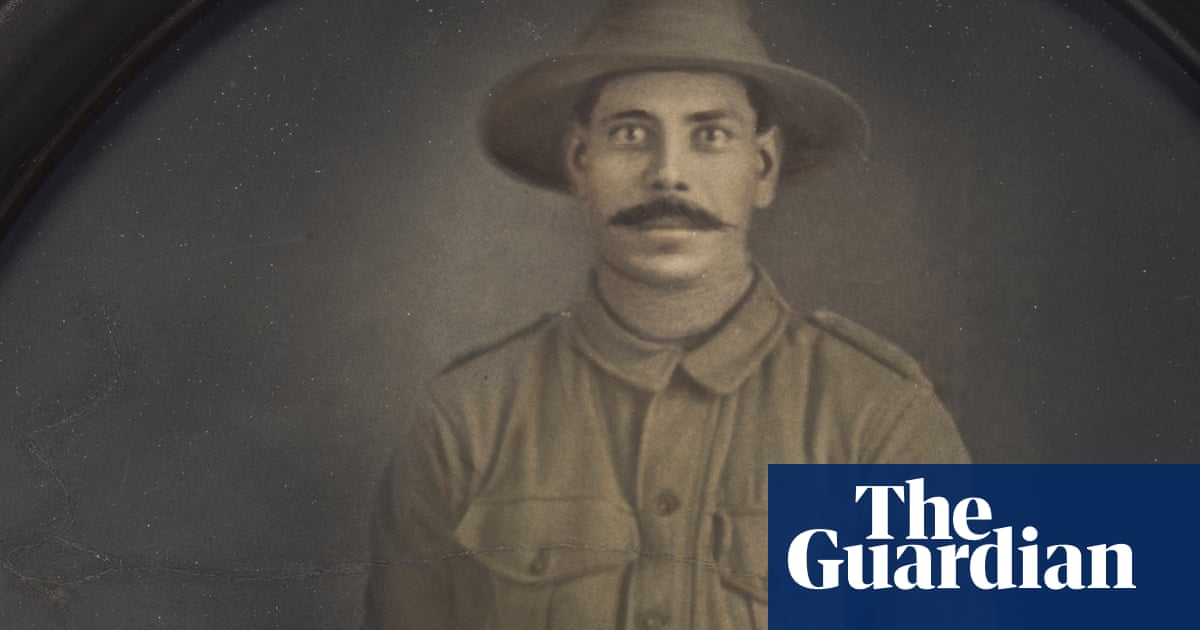Outside the French town of Péronne on 31 August 1918, Private William Allan Irwin – a Gomeroi man from near Coonabarabran inNew South Wales– was pinned down by German machine-gun fire alongside fellow Australian soldiers from the 33rd infantry battalion.
They had been ordered to wrest control of enemy-held positions in an area known as Road Wood during the battle of Mont St-Quentin.
In the face of heavy fire Allan rushed three machine-gun nests, capturing the weapons and crews.The job not done, he tried to capture a fourth, where he was fatally wounded. He died the next day.
Despite his bravery, for which he was posthumously awarded the distinguished conduct medal, Bill Allan was never recognised as a citizen of his own country.
Now, more than 106 years later, he has been made an honorary citizen of France’s Somme Valley.
Allan was one of about 1,000 Aboriginal and Torres Strait Islander menwho fought for Australia in the first world war. He joined the army in 1916 when the Defence Act of 1909 barred recruits who were “not substantially of European origin or descent”. (This restriction was lifted in 1917.)
According to at leastone account, it was a broken heart that prompted the 37-year-old to volunteer. He had been working with his brothers, Harry and Jack, as a shearer in towns across NSW including Quirindi, Werris Creek and Moree. In 1915 the woman he hoped to wed married another man.
Harry sought to stop his brother joining the Australian Imperial Force, even riding his horse to Newcastle to try to intervene before the troop ship left Australia in May 1916.
Sign up for the Afternoon Update: Election 2025 email newsletter
After four months training in England, Allan landed in the mud and trenches of the western front, taking part in the Battle of Messines, where he was wounded and sent back to England to convalesce. On his return to France he was injured a number of times. His bodywas buried at Daours.
The Somme Valley community of communes, which comprises 33 townships across the region, held a “day of tribute” last week in Allan’s honour.
A representative, Stéphane Chevin, said: “Learning about his life and service inspired us to reflect on the values he embodied – bravery, resilience, and a strong sense of duty.
“This is the very first time that our region has awarded this distinction, by honouring soldier Irwin we are also paying tribute to the Aboriginal community whose history has too often been overlooked.”
Allan’s great-nephew Peter Milliken, who travelled to France for the ceremony, says the recognition “means a hell of a lot”.
“He’s never been a citizen of anywhere and, for the French to do this, it’s a big honour,” he says, adding that theAustralian government “probably should have done this years ago”.
A picture of his great-uncle always had price of place at his nanna’s home in Walhallow, NSW, Milliken says.
“I’m 67 now and this story I’ve probably known since I was three or four years old. My whole family knows about this man and we always have – the story’s been handed down for over 100 years.”
Sign up toAfternoon Update: Election 2025
Our Australian afternoon update breaks down the key election campaign stories of the day, telling you what’s happening and why it matters
after newsletter promotion
The French recognition of Allan’s service was made possible largely through the work of a Gomeroi/Yullaroi man, Joe Flick, and his project Bringing Their Spirits Home, along with a documentary by the Yuwaalaraay film-maker Dylan Nicholls.
Over a decade Flick documented and photographed the first world war graves of Aboriginal soldiers in the UK, France and Belgium. Nicholls was so moved by Flick’s project that he made the documentary about it.
“It’s so sad that we have so many of our mob over there buried so far away from their traditional country,” he says.
“So I had an idea I wanted to make a documentary about a descendant’s journey of going over to France and visiting their ancestor’s grave and I came across the story of William Allan Irwin DCM.”
All three men travelled to France last year to shoot Bringing His Spirit Home and to walk in the footsteps of Allan, seeing where he fought and fell, and where his body lies.
“I wasn’t the first to go to the gravesite, there’s probably been three or four family members that have been over there before,” Milliken says.
“I was the first to be able to go to the battleground … to walk over that was very emotional.”
OnAnzac DayMilliken will pay tribute to his great-uncle in Paris: “I’ll get to lay a wreath for the old fella … I’m pretty honoured,” he says.
Milliken and the rest of Allan’s extended family hope that one day his body can return home to Gomeroi country.
“He was a great a man, you know, and he really deserved to come home,” Milliken says.
“For Gomeroi people we need to be buried back on country and we’re never at rest until you’re back on your own country – it’s the Aboriginal thoughts and ways.”
